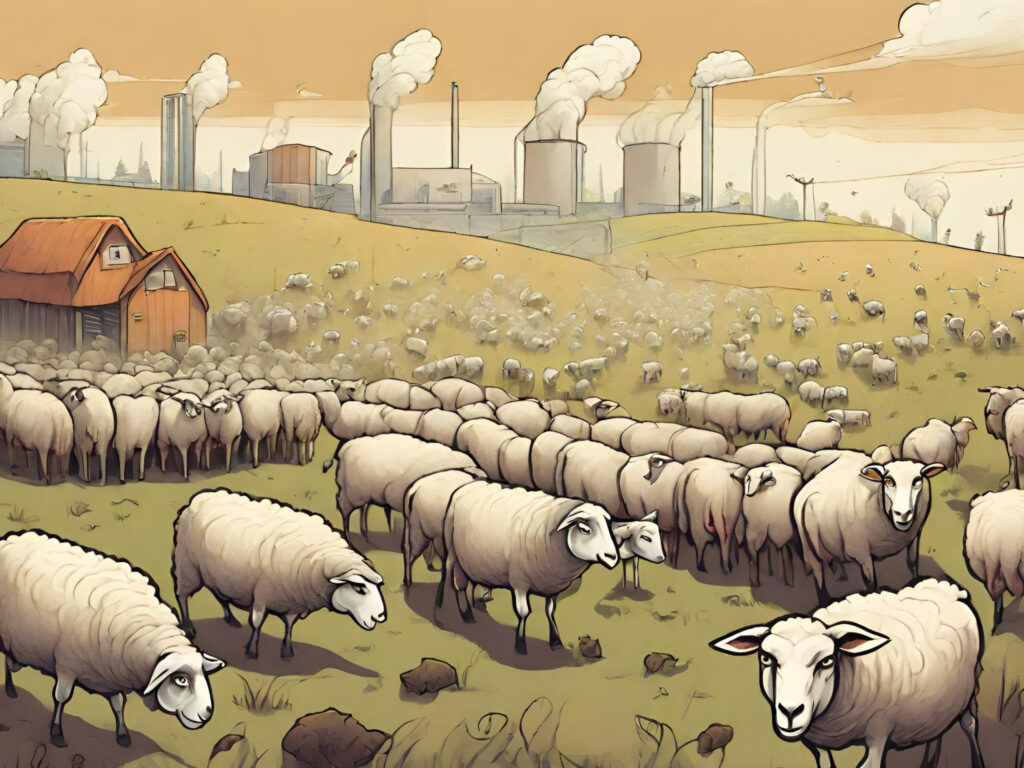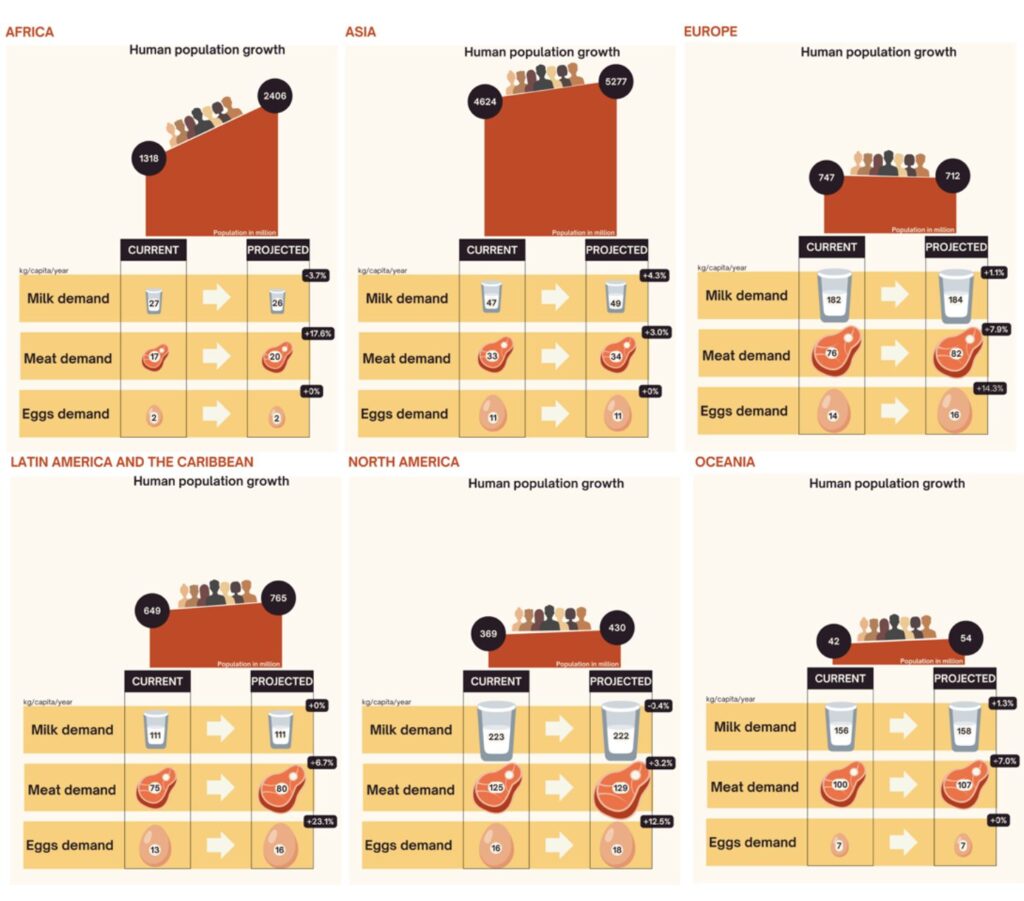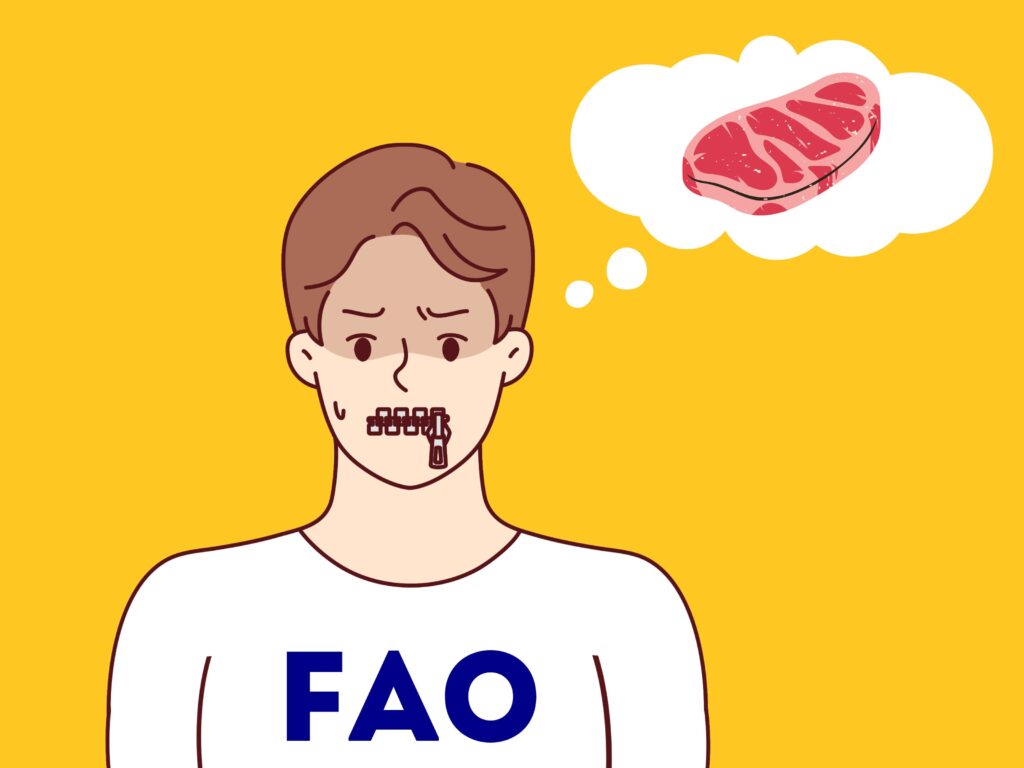Over 100 Organisations & Experts Ask FAO to Retract ‘Inappropriate’ COP28 Livestock Report
7 Mins Read
In an open letter, academics and organisations from across the world have asked the FAO to withdraw a livestock emissions report that they claim contains “significant methodological errors”.
A group of over 100 organisations, politicians, investors and experts have called for a retraction of a report by the UN Food and Agriculture Organization that suggests reducing livestock agriculture will only have a small impact on climate change.
Launched during COP28, the Pathways Towards Lower Emissions report’s estimated emissions reduction from cutting back livestock production as six to 40 times lower than the scientific consensus. It has been criticised multiple times, with leading academics calling out the UN body for not recommending a reduction in meat consumption.
In April, Leiden University’s Paul Behrens and New York University’s Matthew Hayek – whose research formed the basis of the FAO’s analysis – asked the organisation to urgently retract its report, and reissue it with more appropriate sources and methodology.

Two months on, 78 civil society organisations and 23 academics and influential individuals have sent a joint letter to FAO director-general Qu Dongyu, citing the “significant methodological errors and inappropriate sources of evidence” identified by Behrens and Hayek to suggest that scientific rigour is “conspicuously and egregiously absent” in the report.
“It is extremely concerning that such basic failures of analysis made it into a published FAO report without being flagged during the peer-review process – indicating the need for a comprehensive investigation of how these serious errors and systemic biases were allowed,” the letter reads, a reference to an investigation that found the FAO censored its own employees following pressure from the livestock lobby to downplay the climate impact of animal agriculture.
“While it is reasonable to involve stakeholders in such a report, it is very disappointing to see the pathways and recommendation in the report being so heavily skewed by vested interests,” said Pete Smith, professor of soils and global change at the University of Aberdeen.
“The science is clear that a reduction in consumption of livestock products is overconsuming countries is an essential lever for climate change mitigation, so it is unfathomable to see this option practically ignored and the science misused. The FAO has long been a trusted voice in the space, which makes this report even more disappointing.”
Asking for a retraction, the experts call for “an overhaul of the FAO’s internal review processes to ensure improved methodological rigour in future reports”. They are asking the UN body to publish a full methodology and a list of authors and reviewers for all future reports.
FAO ‘out of step’ with scientific consensus and fellow UN bodies

The letter calls the FAO’s estimate that dietary change can reduce livestock emissions by only 0.19-0.53 gigatonnes of CO2e per year “completely out of step” with the conclusions from other UN institutions and general scientific consensus.
The International Panel on Climate Change (IPCC) – another UN organisation – has found that a shift to more plant-based diets could mitigate emissions by between 0.7–8 gigatonnes of CO2e annually, with higher reductions in meat and dairy leading to higher emission reductions.
In a recent survey of 210 global climate scientists – over half of whom have authored IPCC reports – it was outlined that livestock emissions must peak by next year, and be halved by the end of the decade. And most agreed that plant-based analogues that are at parity or outperform animal products on health and emissions should be considered the ‘best available food’, and given preference in climate (cited by 83%), agriculture (78%) and food purchasing policies (82%).
The UNEP, meanwhile, produced a landmark report (also during COP28) that endorsed alternative proteins’ potential to reduce emissions, land degradation, water and soil pollution biodiversity loss, and zoonotic disease and anti-microbial resistance risks, in direct comparison to animal-derived foods.
The FAO produced a draft 2050 Roadmap to reduce food system emissions last year, which it will routinely update, with the finalised document due at the end of 2025, in time for COP30 in Belém, Brazil. But the experts have “grave concerns” if the FAO plans to use analysis from the Pathways to Lower Emissions report to guide the roadmap.
“The roadmap is a report of great significance, which will have global influence on governments’ and companies’ plans to reduce emissions from food systems, and it is therefore of utmost importance that it maintains the highest standards of scientific rigour,” the letter reads.
“We thus recommend that the release of the 2050 Roadmap be delayed until the FAO has engaged in serious dialogue with experts and civil society in a reflective process to assess what went wrong in the Pathways report – and adopt more robust, inclusive and transparent processes in the creation of the next instalment of the 2050 Roadmap report.”
FAO’s estimates of livestock emissions questioned

Scientists have previously voiced concerns over the continued decline in the FAO’s estimate of global livestock emissions. A 2006 report suggested that meat and dairy production accounts for 18% of all emissions, which was revised to 14.5% in 2013, and is now said to be 11.2% based on a new GLEAM 3.0 model.
Other studies, however, dispute these calculations, putting the emissions contributions at 20% or between 16.5-28.1%. “The Pathways report attributes this [decline] to ‘differences in methodology, input data and global warming potential values’ and gives topline explanations of data sources, but greater transparency of the calculations is required,” the letter states.
The experts call on the FAO to publish the sources used for the GLEAM estimates and the identities of the experts involved in their production, with disclosures of any potential conflicts of interest. “The scientific rigour of GLEAM is particularly important in light of the global influence of GLEAM, which is used by many countries and companies in national and corporate reports,” they write.
The final point made by the letter was related to the health credentials of plant-based foods: “We urge the FAO to increase its engagement with nutritional experts and other UN agencies, such as the World Health Organisation, to investigate further the evidence behind the nutritional adequacy and benefits of healthy diets containing [fewer] animal products and more plant-based foods, including in the Global South.”
The letter notes how many countries’ official dietary recommendations now support lower-meat diets as nutritionally adequate. Germany’s nutrition society recently revised its stance on veganism, suggesting it can be a “health-promoting diet”, months after calling on citizens to slash their meat intake by half, and eat a diet with at least 75% plant-sourced foods.
The Nordic nations, Taiwan and Canada have all recently realigned their nutritional guidelines to better focus on plant-based foods too. South Korea and Denmark have adopted national plans to promote plant-based agriculture and innovation – the latter last week approved the world’s first carbon tax on livestock agriculture.
Experts highlight errors in FAO report

The joint letter – which was penned by organisations including Feedback Global, Greenpeace, Friends of the Earth US, and the Changing Markets Foundation – lists numerous errors made by the FAO’s COP28 report.
There are four significant methodological inaccuracies. The FAO is accused of “double counting meat emissions to 2050” – once for business-as-usual projections for increased meat intake by 2050, and again in the estimation of emissions mitigation potential of dietary change. This “erroneously factors in both projected increases in meat consumption in some countries and decreases in others”.
The FAO also calculated net changes in livestock emissions of dietary change, incorrectly “including emissions from increases in vegetable, fruit and nut consumption, which are unrelated to substituting meat and dairy in diets”.
Meanwhile, the UN body mixed different baseline years in its analysis, which meant that “emissions savings compared to current diets are falsely represented as potential emissions savings” in a business-as-usual scenario for 2050. Moreover, the FAO “inappropriately” compared emissions reductions of national dietary recommendations to a total emissions quantity “from an incomparable paper”.
Additionally, the authors claim the FAO “conflates sustainable healthy diets with nationally recommended diets” (most of which don’t factor in sustainability), and “fails to model the emissions mitigation potential” from frameworks that do account for sustainability, like the EAT-Lancet Commission’s Planetary Health Diet.
“As a knowledge-based organisation, FAO is fully committed to ensuring accuracy and integrity in scientific publications, especially given the significant implications for policymaking and public understanding,” an FAO spokesperson told the Guardian in April.
“We would like to assure you that the report in question has undergone a rigorous review process with both an internal and external double-blind peer review to ensure that the research meets the highest standards of quality and accuracy, and that potential biases are minimised. FAO will look into the issues raised by the academics and undertake a technical exchange of views with them.”



